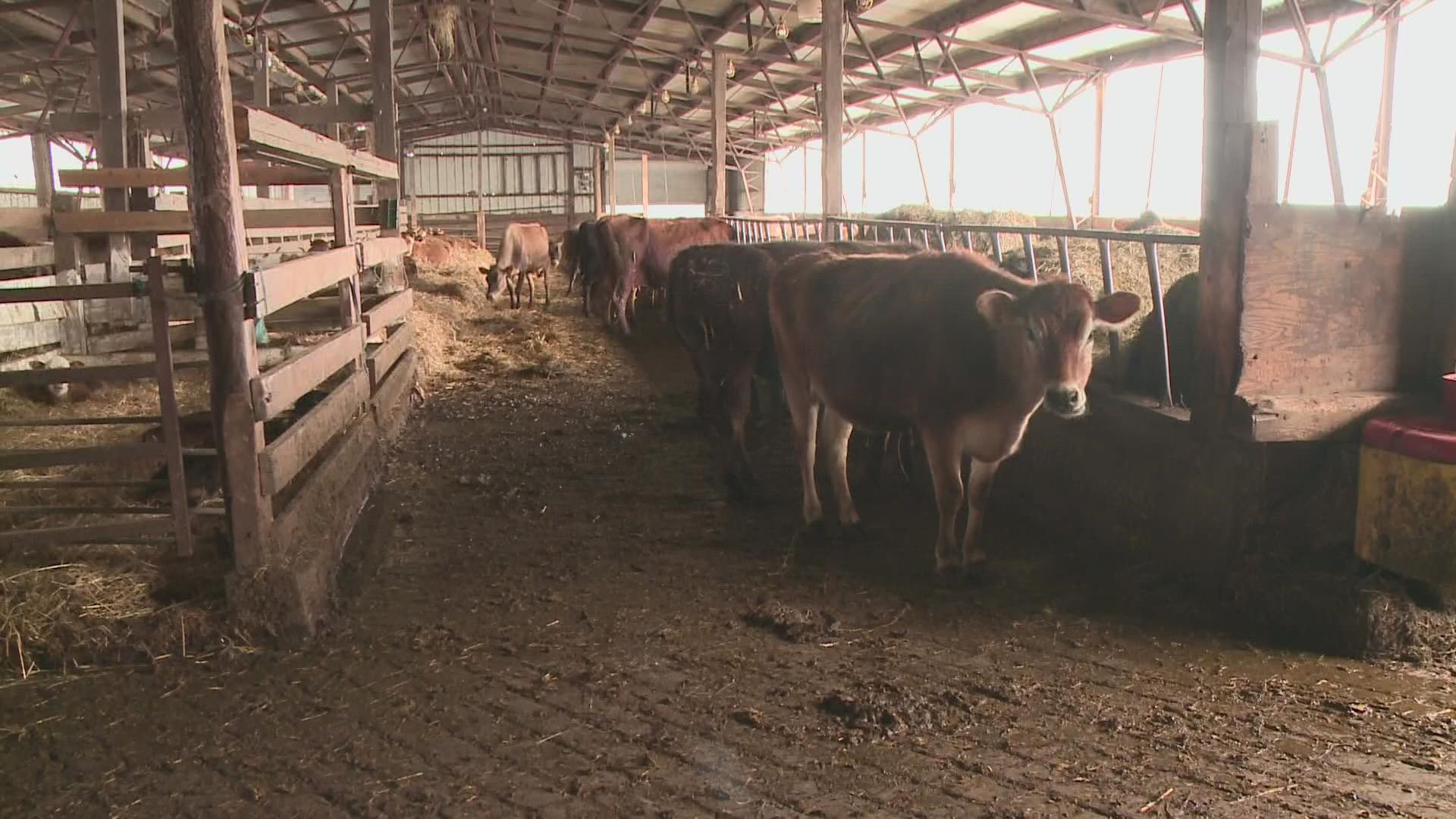ALBION, Maine — Contamination from toxic chemicals known as PFAS has forced more Maine farms to pull their products.
The sludge was hauled to farms across the state and used as fertilizer. Over time those compounds leached into the groundwater.
Nearly a dozen farms have been flagged for high levels of toxic compounds. With state testing by the Department of Environmental Protection only in the early stages, that number is expected to grow.
A new bill, which would set up a multimillion-dollar fund to address this crisis, is making its way through the Maine Legislature. The bill, LD 2013, would set up an advisory committee and fund of $100 million to pay for testing, health monitoring, clean-up, and a new path out of a toxic nightmare.
For nearly a decade, Brendan Holmes and his family have been running Misty Brook Farm, a 500-acre organic dairy farm in Albion.
After high levels of PFAS chemicals were discovered in the soil, water, and produce at a nearby farm last fall, Holmes tested his fields, well, and dairy products. His fields were spread with wastewater sludge, used as free fertilizer, under a previous owner.
Thankfully, the well came back completely fine, but the feed and the milk did not.
The source of the contamination was 35 bales of hay purchased from an organic farm. His entire herd of Jersey cows consumed the tainted hay for two months.
"The owners of that farm had no idea their farm was contaminated until I notified them," Holmes added.
The compounds are known as "forever chemicals" because they take years to break down in the environment. In federal health studies, the chemicals have also been linked to serious health problems, including organ cancers.
With levels above the safe limit, the farm pulled milk, cream, and grass-fed beef from shelves of 35 grocery stores. The farm has also paid for dozens of PFAS tests, which run about $500 each.
"I can go a week and a half without any income. Then I am insolvent," Holmes explained.
More than nine farms have been identified by the Department of Agriculture, Conservation, and Forestry as having high levels of PFAS contamination.
DEP regulators are testing the first tier of sites that received high volumes of sludge, a state-approved practice dating back to the 1970s. With as many as 700 potential sites, that survey is expected to take years, prompting more farmers to test at their own expense.
"They need testing support. They need funds to be able to pivot their business to something different depending on their test results. And ultimately, they do need a buyout," Sarah Alexander, the director of the Maine Organic Farmer's and Gardener's Association, said.
MOFGA and the Maine Farmland Trust have set up a PFAS emergency relief fund to help farmers dealing with PFAS exposure. Farmers can apply for grants to pay for testing and supplement the lost income.
The DACF, meanwhile, is asking for $3 million in Gov. Janet Mills' supplemental budget to deal with the PFAS crisis.
Testifying recently before the Legislature's Appropriations and Financial Affairs Committee, Commissioner Amanda Beal said the funding would go toward hiring more staff, increasing testing capacity, and setting up a long-term assistance fund.
"The program we are working on would replace their income for up to a year as a starting point. For some farms, it could take longer," Beal testified.
But MOFGA said a much larger investment by the state is needed now. The organization, along with several farmers and other producers, testified at a public hearing in favor of LD 2013. The bill before the Legislature's Agriculture, Conservation and Forestry Committee would set up an advisory committee and tens of millions in a dedicated fund to support farmers on several issues, including mortgage payments, health monitoring, new infrastructure, and a buyout program of contaminated land.
"We think that $100 million are a reasonable projection of what is going to be needed to help farms and Maine can emerge," MOFGA Deputy Director Heather Spalding said.
Recent testing shows Misty Brook's products are now PFAS-free, and those products are expected to be back on store shelves soon.
A GoFundMe is also raising money to help purchase a new herd of organic cows. But questions remain about whether impacted farmers can find a way to survive this toxic nightmare.
"That land is never going to produce food for humans for the next two to three thousand years," Holmes said.
For more information on PFAS health studies from the Agency for Toxic Substances and Disease Registry, click here.

